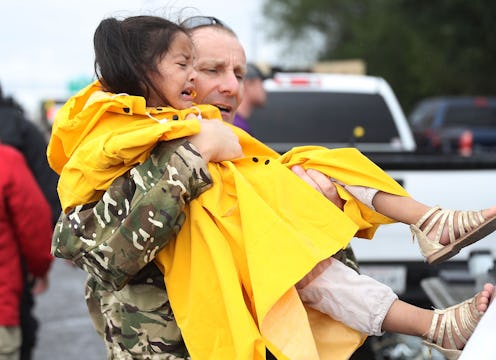News
FEMA Can't Help Houston's Undocumented Immigrants Recover From Hurricane Harvey

While much of the national consciousness is now directed towards the looming threat of Hurricane Irma making landfall in Florida, it's important to not forget the plight of the thousands of residents in the greater Houston area. Just weeks after their homes and communities were slammed by Hurricane Harvey and flooded-out in the midst of record-breaking rainfall, it's becoming clear that the recovery effort is going to take a long time. But not all the victims will get the same help from the federal government ― Houston's undocumented immigrants won't get FEMA aid after Harvey, and that's a huge problem.
According to NPR, some 600,000 undocumented immigrants, possessing no legal status to live in the United States, currently reside in Houston. It's not surprising that the community is so large as Texas is a border state, and Houston is one of its metropolitan hubs. Immigrants lacking legal status to reside in the country, however, are not eligible to receive recovery aid from the Federal Emergency Management Agency.
There is an exception — undocumented parents of U.S. citizen children can file for relief on their child's behalf. But despite that, many undocumented families are reportedly fearful that applying on behalf of a citizen child would only enable an already-hostile federal governmen to come after them. According to NPR's report, in the aftermath of the storm, a Houston undocumented mother Roxana Sosa voiced exactly that concern:
We're afraid. That's why we don't declare our losses. We haven't even gone to the management office here at the apartment complex.
It's not hard to see why undocumented Houstonians would be fearful of making claims to the federal government for relief aid, even under circumstances where a family member has legal residency. Over the last few weeks, the Trump administration has publicly toyed with the notion of ending the Deferred Action for Childhood Arrivals (DACA) program. On Tuesday, Attorney General Jeff Sessions announced that the administration would, indeed, be rescinding the program, putting the lives of 800,000 undocumented immigrants in jeopardy.
First established in 2012, one of the foremost concerns that would-be DACA applicants had about the program was the possibility that any information they volunteered could ultimately be used against them if a hardline anti-immigration administration took power. And so far, between the virulent anti-immigrant rhetoric throughout his presidential campaign, an escalation in ICE raids and deportations, and the launching of a federal office dedicated to publicizing crimes committed by immigrants, it's clear that the Trump administration fits the bill.
As such, families like the Sosas now face a very similar dilemma, carrying with it many of the same fears. The current administration being what it is — and considering the Obama administration already set the record for the most deportations over an eight-year presidency — countless undocumented immigrants are understandably reluctant to give the government any more information.
Of course, as far as Harvey is concerned, that's a concern strictly felt by those families who can actually file a claim. Immigrants who aren't legal residents and don't have young children with American citizenship won't even have that choice.
And when you consider the staggering number of undocumented immigrants reportedly living in the city of Houston ― 600,000 exceeds the entire population of the city of Miami, for a sense of perspective ― that inability to access federal aid figures to have hugely negative consequences on the overall health and recovery of many communities.
As it stands now, many experts predict the Harvey recovery effort could take years, a sentiment echoed by Texas lieutenant governor Dan Patrick this week. In addition to having claimed more than 70 lives, Harvey is believed to have caused approximately $180 billion in property damage, as well as exposed huge inadequacies in the city's flood-related infrastructure.